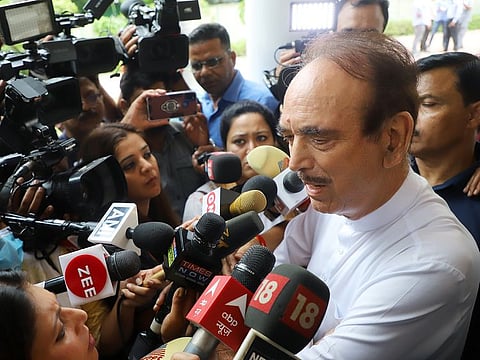India: BJP may have big plans for Ghulam Nabi Azad
While Ghulam Nabi is “Azad” from Congress, the question remains whether he really is free?

Ghulam Nabi Azad, 73, former Chief Minister of Jammu and Kashmir and veteran Congress leader quit India’s grand old party. In his five page resignation letter, he laid the blame squarely on Rahul Gandhi and his lacklustre leadership.
Azad then went on to give serial interviews to all TV channels where he made intemperate attacks on the Congress, singling out Jairam Ramesh, Congress leader, as a politician given to planting of “dirty stories” and Pawan Khera, national spokesperson of Congress as a “chaprasi” (office peon). Azad’s attacks said more about his own leadership than those whom he attacked.
But, in India politics is nothing of what it seems on the surface. Azad has publicly said that his next step would be to set up a political party in Jammu and Kashmir — his home turf.
You would reckon that the reading down of the special status of Jammu and Kashmir in the Indian union and reducing the state to a Union Territory would upset Azad, who hails from Doda and is a former CM of J&K.
You could be wrong: Azad shares a most congenial relationship with Prime Minister Narendra Modi and Home Minister Amit Shah. Modi famously cried when Azad retired from the Rajya Sabha.
He was promptly awarded a Padma award and the government generously allowed Azad to keep his prized Lutyens bungalow, where he has lived for decades and also his Z plus security.
Azad says all this was done because he faces a high security risk and has been the target of several assassination attempts.
Big plans for Azad
But, the truth is that the Bharatiya Janata Party (BJP) government has kept Azad sweet because it may have big plans for him in its new policy for Jammu and Kashmir.
Elections are likely in the Union Territory next year after the process of delimitation of constituencies is done.
As Azad left the Congress with the parting kick of a scathing resignation letter, many Congress party workers and local leaders in Jammu and Kashmir also quit. Azad’s exit ensures that the limited number of party workers still carrying the Congress flag in J&K come down to single digits.
This will help both the regional parties — the Omar Abdullah led National conference (NC) and the Mehbooba Mufti led J&K People’s Democratic Party (PDP), but will also be a shot in the arm for the BJP, which expects to sweep the Jammu region when elections are held.
Clearly the two valley parties will not ally with the BJP again after a bitter experience. Enter Azad and his new party, which would not consider the BJP untouchable at all.
If the BJP sweeps Jammu then it could prop up a Chief Minister, who is directly amenable to Delhi. Senior political leaders — both in the BJP and Congress talk in hushed whispers about what is called the “Azad plan” but, currently specifics are extremely dim.
To ensure his success as a local leader in Kashmir, Azad would have to publicly attack and take on the BJP but, says a valley politician, “Noora khusti (fake fight) has always been famous in Srinagar with leaders pretending to us that they fight Delhi”.
The smoke and mirrors — that is the politics of Kashmir is likely to get even more opaque.
All of this begs a question: while Ghulam Nabi is “Azad” from his mothership — Congress, is he really free?
Sign up for the Daily Briefing
Get the latest news and updates straight to your inbox




